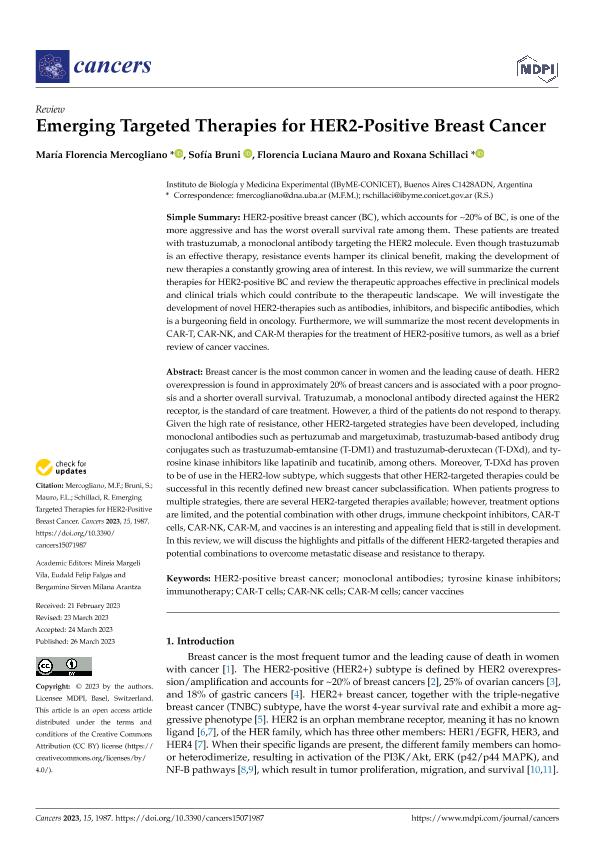Artículo
Emerging Targeted Therapies for HER2-Positive Breast Cancer
Fecha de publicación:
04/2023
Editorial:
MDPI
Revista:
Cancers
ISSN:
2072-6694
Idioma:
Inglés
Tipo de recurso:
Artículo publicado
Clasificación temática:
Resumen
Breast cancer is the most common cancer in women and the leading cause of death. HER2 overexpression is found in approximately 20% of breast cancers and is associated with a poor prognosis and a shorter overall survival. Tratuzumab, a monoclonal antibody directed against the HER2 receptor, is the standard of care treatment. However, a third of the patients do not respond to therapy. Given the high rate of resistance, other HER2-targeted strategies have been developed, including monoclonal antibodies such as pertuzumab and margetuximab, trastuzumab-based antibody drug conjugates such as trastuzumab-emtansine (T-DM1) and trastuzumab-deruxtecan (T-DXd), and tyrosine kinase inhibitors like lapatinib and tucatinib, among others. Moreover, T-DXd has proven to be of use in the HER2-low subtype, which suggests that other HER2-targeted therapies could be successful in this recently defined new breast cancer subclassification. When patients progress to multiple strategies, there are several HER2-targeted therapies available; however, treatment options are limited, and the potential combination with other drugs, immune checkpoint inhibitors, CAR-T cells, CAR-NK, CAR-M, and vaccines is an interesting and appealing field that is still in development. In this review, we will discuss the highlights and pitfalls of the different HER2-targeted therapies and potential combinations to overcome metastatic disease and resistance to therapy.
Archivos asociados
Licencia
Identificadores
Colecciones
Articulos(IBYME)
Articulos de INST.DE BIOLOGIA Y MEDICINA EXPERIMENTAL (I)
Articulos de INST.DE BIOLOGIA Y MEDICINA EXPERIMENTAL (I)
Citación
Mercogliano, María Florencia; Bruni, Sofia; Mauro, Florencia Luciana; Schillaci, Roxana; Emerging Targeted Therapies for HER2-Positive Breast Cancer; MDPI; Cancers; 15; 7; 4-2023; 1-50
Compartir
Altmétricas




